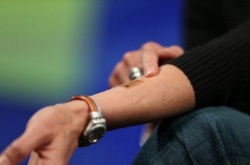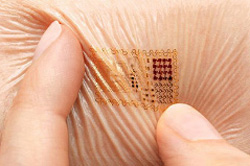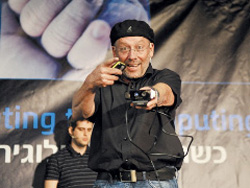The newest technologies are not necessarily the best technologies for humanity
by Arnaldo
 How will the future of humanity look like? For many of us, it is a very interesting and inspiring topic. Many still have the hope that the developing technology will bring with it better understanding between people, more freedom, vaster knowledge and well being, and eventually why not, even the end of all wars and the long hoped world peace.
How will the future of humanity look like? For many of us, it is a very interesting and inspiring topic. Many still have the hope that the developing technology will bring with it better understanding between people, more freedom, vaster knowledge and well being, and eventually why not, even the end of all wars and the long hoped world peace.
To a certain extent, technology can be considered neutral. It can bring prosperity and better values for the entire humanity; but on the other hand it can also lead to a moral decay of our society. As in the case of the nuclear power, too often do we find that humanity is not mature neither responsible enough “to play” with such dangerous technology. From this perspective, by analyzing the newer trends on the electronics market and the global tendencies of the biggest corporations, more often than not we get a not at all bright view regarding our close future.
Technological surprises from Google
Regina Dugan, former director of the Defense Advanced Research Agency (DARPA) and current head of Google-owned Motorola’s research division, now leads special projects for Motorola. Among the new developments that Google is preparing for us we can include:
 An electronic tattoo (a thin layer of artificial skin which includes a tiny transmitter) that can be used to authenticate a user instead of a password. It’s made by a company called MC10 that Motorola is partnering.
An electronic tattoo (a thin layer of artificial skin which includes a tiny transmitter) that can be used to authenticate a user instead of a password. It’s made by a company called MC10 that Motorola is partnering.
“Vitamin authentication”, a pill that can be ingested. When swallowed, the acids in our stomach serve as the electrolyte, and they power it up so the switch goes on and off, while creating an 18-bit ECG-like signal in the body. Essentially, the entire body becomes an authentication token.
Microchip implanted in the brain of the users – The ultimate ambition is to literally get inside users’ heads: using search queries to read thoughts and then fulfilling the data needs by sending results directly to these microchips. Ben Gomes, Google’s Vice-President of Search told recently that the sinister-sounding vision is far from a sci-fi fantasy and that research had already begun with such chips to help disabled people steer their wheelchairs.
 Researches of “deep neural networks” (our language processing centers) are among the new domains of research of ‘DNNresearch’ (aquired by Google on March 2013). At about the same time, Ray Kurzweil (one of the leading scientists in the field of artificial intelligence), joined the search giant. Nonetheless, the hiring raised many eyebrows, since Kurzweil is perhaps the most prominent proselytizer of “hard Artificial Intelligence”, which argues that it is possible to create consciousness in an artificial being.
Researches of “deep neural networks” (our language processing centers) are among the new domains of research of ‘DNNresearch’ (aquired by Google on March 2013). At about the same time, Ray Kurzweil (one of the leading scientists in the field of artificial intelligence), joined the search giant. Nonetheless, the hiring raised many eyebrows, since Kurzweil is perhaps the most prominent proselytizer of “hard Artificial Intelligence”, which argues that it is possible to create consciousness in an artificial being.
Artificial brain – another one of Google’s recent revelation regarding research. Studies made by Google using techniques of deep learning to produce an artificial brain, were followed by a subsequent hiring of the godfather of computer neural nets, Geoffrey Hinton.
Taking all these into consideration, it would seem that Google is probably becoming the most daring developer of Artificial Intelligence, a fact that some may consider thrilling and others deeply unsettling. Or both.
Microchip implants under the skin are beyond the point of prototypes
 If just 20 years ago, a person would have told you that implants of a microchip under the skin will one day become a reality, you would say that it is very little possible. And if that person would have told you that one day will come in which everyone will be obliged to have the microchip implanted, you would think he is greatly exaggerating.
If just 20 years ago, a person would have told you that implants of a microchip under the skin will one day become a reality, you would say that it is very little possible. And if that person would have told you that one day will come in which everyone will be obliged to have the microchip implanted, you would think he is greatly exaggerating.
However, during Intel Developer Forum San Francisco (September 2013) – Mooly Eden, vice-president in global Intel said the following: “we will get implants inside the skin – you cannot bring progress backwards. We already see the direction of things by size and energy consumption. The problem will be in Hollywood – it is hard to make sci-fi when everything became the existing reality”.
Eden mentioned other future technologies as well: together with Nuance Communication, Intel is developing a voice analyzing software. This software would be able to allow us to speak long conversations with the computer, which will understand the connotation of the things we say and therefore this will remove the need of touching the computer.
In addition, there were presented the next generation of 3D cameras. “The camera will identify how you behave and will differentiate if you are calm or angry.” Newer experiments are in the field of brain technologies, for example to control the computer by thought. “The eyes might be closed, but the device will recognize your brain waves. The computer will identify the specific activity, so even if you just think of the word ‘Left’ but without actually saying it, the computer will understand you. It is scary. When you see it for the first time you say ‘oh my God!’”
Intel recently declared that it will invest 10 million euro in research in the field of ‘Machine Learning’.
Increasing usage of RFID technology
 RFID chips (Radio-frequency identification devices) are a daily part of the electronic age — found in passports, payment cards and a growing number of similar cards. Eventually they’re expected to replace bar-code labels on consumer goods. In many countries they are implanted inside animals, especially house pets. An increasing amount of people in the world have already implanted this micro-chip under their skin.
RFID chips (Radio-frequency identification devices) are a daily part of the electronic age — found in passports, payment cards and a growing number of similar cards. Eventually they’re expected to replace bar-code labels on consumer goods. In many countries they are implanted inside animals, especially house pets. An increasing amount of people in the world have already implanted this micro-chip under their skin.
More and more schools in different countries began to adopt cards with embedded RFID microchip, for authentication and monitoring students in the campus, from the moment they arrive until departure. However, there are people who consider the microchip to be the “Mark of the Beast”, the one that we are warned in Revelation 13:16-18. Andrea Hernandez, a student at Northside Independent School District in San Antonio, Texas, became famous for her firm refusal to wear this card which includes RFID microchip and that as a result of this conflict, had the courage to make a law suit against the school.
New technologies, new problems
On May 2010, a British scientist was the first man in the world to become infected with a computer virus. Dr. Mark Gasson from the University of Reading had a microchip inserted in his hand which was then infected with a virus. The device, which enables him to pass through security doors and activate his mobile phone, is a sophisticated version of RFID chips used to tag pets. Dr. Gasson claims that “with the benefits of this type of technology come risks. We may improve ourselves in some way but much like the improvements with other technologies, mobile phones for example, they become vulnerable to risks, such as security problems and computer viruses.” Regarding this issue, proffessor Rafael Capurro of the Steinbeis Transfer Institute of Information Ethics in Germany told that “if someone can get online access to your implant, it could be serious. Surveillance can be part of medical care, but if someone wants to do harm to you, it could be a problem.”
When science becomes infantile…
 In Japan about a year ago, Shota Ishiwatari invented “Tailly” – a waist belt with moving tail that waggles when you get excited (in relation to one’s heart rate). As we can observe, not any invention is leading to our next step in the scales of evolution. Sometimes, it is quite the opposite.
In Japan about a year ago, Shota Ishiwatari invented “Tailly” – a waist belt with moving tail that waggles when you get excited (in relation to one’s heart rate). As we can observe, not any invention is leading to our next step in the scales of evolution. Sometimes, it is quite the opposite.
Vigilance, awareness and positive action
We could consider that these new technological trends are not as bleak, that as Mooly Eden, Intel’s Vicepresident said, we cannot oppose progress. Nevertheless, we should notice that these trends are global and are not limited to one country or another. The experiment which we observe in one part of the globe, soon afterwards becomes a reality to the rest of the globe. This indicates a possible hidden agenda which controls the visible governments of the world and the associations which collaborate with them. In addition, to say that we can not oppose certain trends is a priori elimination of our free will, our ability to choose. In fact, we are free at any time to choose that which we consider as right, divine and beneficial for us.
Therefore, prior to purchase, use or support a specific technology, we should always ask who promotes and controls the new technology, what their true intentions are, who has something to gain from this new technology and what would be the next step and the way to use this technology.
More often than not, the famous phrase that the first step in getting rid of demonic possessions is to expose the work of these evil forces, applies to these issues. We must seek to increase our awareness in order to know how to act and against whom should we act.
We should understand the directions towards which the technological trends’ are facing, and if we do not want to follow these directions, to oppose with everything that we know and we can. The fact that we live in these times, in this society, is not a coincidence; and to remain passive and to say that these issues are not interesting or that we cannot do anything is a great mistake because, ultimately, all of this will be reflected upon us whether we want it or not, but if we wait while putting our hands in the pockets then might come the time in which we would no longer be able to choose. And if a satisfying alternative solution for a good action does not exist yet, then we can begin to create one right now by ourselves.
yogaesoteric
October 2013
Also available in:
 Română
Română
